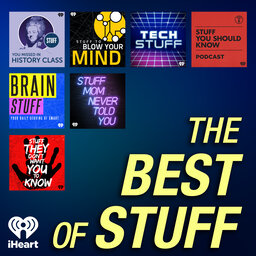Psychedelics Playlist: The Manifested Mind, Part 5
What are psychedelics? How have these substances influenced human minds and culture? What exactly do they invoke in the brain and how could a renaissance of scientific study into their properties improve our lives? In this series of Stuff to Blow Your Mind episodes, Robert and Joe explore the world of entheogens.
Learn more about your ad-choices at https://www.iheartpodcastnetwork.com
 The Best of Stuff
The Best of Stuff


